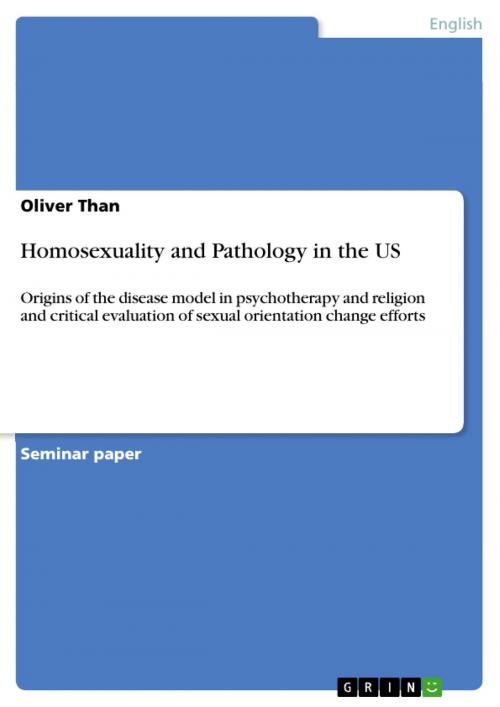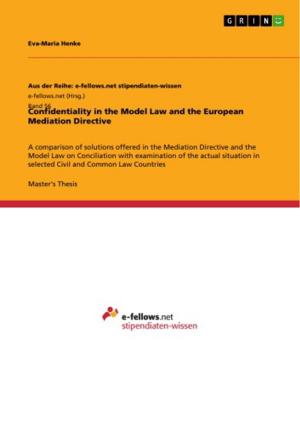Homosexuality and Pathology in the US
Origins of the disease model in psychotherapy and religion and critical evaluation of sexual orientation change efforts
Nonfiction, Entertainment, Drama, Anthologies| Author: | Oliver Than | ISBN: | 9783640685806 |
| Publisher: | GRIN Publishing | Publication: | August 20, 2010 |
| Imprint: | GRIN Publishing | Language: | English |
| Author: | Oliver Than |
| ISBN: | 9783640685806 |
| Publisher: | GRIN Publishing |
| Publication: | August 20, 2010 |
| Imprint: | GRIN Publishing |
| Language: | English |
Seminar paper from the year 2010 in the subject American Studies - Culture and Applied Geography, grade: 1.0, University of Duisburg-Essen (Institut für Anglophone Kulturen), course: Gay, Lesbian and Queer Literature from the 19th century to the present, language: English, abstract: For almost four decades now organized mental health has declassified homosexuality as a mental illness in the United States of America. After several years of bitter dispute, the American Psychiatric Association decided to remove homosexuality as a mental disorder from the Diagnostic and Statistical Manual of Psychiatric Disorders, its official list of mental diseases. Nevertheless it is remarkable that a demise of therapies designed to change homosexual orientation seems improbable at least, given that some religious political activists and marginalized health professionals are apparently seeking to reinstate the disease-model of homosexuality by presenting stories of presumably cured homosexuals to the American public. Aside the professional media, especially religious groups promoting sexual orientation change therapies recently experienced unwanted popular media coverage.The treatment of homosexualityby medical practitioners is of relatively recent origin. Before 1800, homosexuality was essentially conceived as a merely theological-moral phenomenon. From then onward however, legislative declared it a legal matter until medical professionals declared it a sickness. While at it's time of origin, the medical practitioners' concept of homosexuality as a sickness may have been a liberal and humaneadvance over the conception and punishment of homosexuality as a crime, at the latest since the post World-War II years, psychiatrists andpsychologists can be regarded among the major ideologues of homosexual oppression. Sexual conversion therapies or reparative therapies derive from this disease model portraying homosexuality as a mental disorder and a social evil. Since these terms in my opinion inaccurately imply defectiveness in homosexuality and bisexuality, I chose to refer to such therapy as sexual orientation change efforts in the title of this paper. Today the main groups pursuing these kinds of therapies are the before-mentioned marginalized psychotherapists and conservative Christians. This paper will consecutively show that this kind of therapy should not in any way be influential to the development of public policy since the very origins of the disease model are based on badly flawed assumptions. It will subsequently critically evaluate sexual orientation change efforts in general, addressing several issues as its effectiveness, potential harmfulness and its effect on the public view of lesbian, gay and bisexual people.
Seminar paper from the year 2010 in the subject American Studies - Culture and Applied Geography, grade: 1.0, University of Duisburg-Essen (Institut für Anglophone Kulturen), course: Gay, Lesbian and Queer Literature from the 19th century to the present, language: English, abstract: For almost four decades now organized mental health has declassified homosexuality as a mental illness in the United States of America. After several years of bitter dispute, the American Psychiatric Association decided to remove homosexuality as a mental disorder from the Diagnostic and Statistical Manual of Psychiatric Disorders, its official list of mental diseases. Nevertheless it is remarkable that a demise of therapies designed to change homosexual orientation seems improbable at least, given that some religious political activists and marginalized health professionals are apparently seeking to reinstate the disease-model of homosexuality by presenting stories of presumably cured homosexuals to the American public. Aside the professional media, especially religious groups promoting sexual orientation change therapies recently experienced unwanted popular media coverage.The treatment of homosexualityby medical practitioners is of relatively recent origin. Before 1800, homosexuality was essentially conceived as a merely theological-moral phenomenon. From then onward however, legislative declared it a legal matter until medical professionals declared it a sickness. While at it's time of origin, the medical practitioners' concept of homosexuality as a sickness may have been a liberal and humaneadvance over the conception and punishment of homosexuality as a crime, at the latest since the post World-War II years, psychiatrists andpsychologists can be regarded among the major ideologues of homosexual oppression. Sexual conversion therapies or reparative therapies derive from this disease model portraying homosexuality as a mental disorder and a social evil. Since these terms in my opinion inaccurately imply defectiveness in homosexuality and bisexuality, I chose to refer to such therapy as sexual orientation change efforts in the title of this paper. Today the main groups pursuing these kinds of therapies are the before-mentioned marginalized psychotherapists and conservative Christians. This paper will consecutively show that this kind of therapy should not in any way be influential to the development of public policy since the very origins of the disease model are based on badly flawed assumptions. It will subsequently critically evaluate sexual orientation change efforts in general, addressing several issues as its effectiveness, potential harmfulness and its effect on the public view of lesbian, gay and bisexual people.















